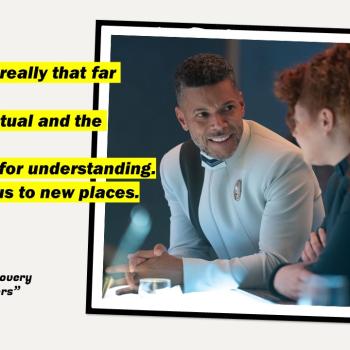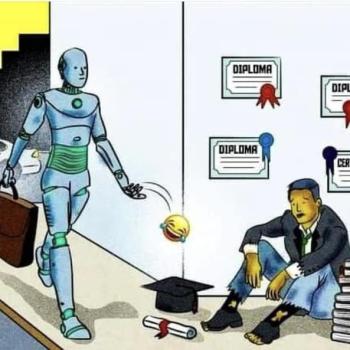Bob Cargill shared this meme that illustrates the problem with the so-called paradox of tolerance nicely:

As you may recall, Ankur Gupta and I use precisely this illustration in our article about the need to prioritize various ethical commitments that we have. Here’s the relevant part of our article:
[W]hen the United Federation of Planets claims to embrace the Vulcan ideology of Infinite Diversity in Infinite Combinations, and yet fights against the Borg, it is not showing that inclusivity is an inherently flawed and self-contradictory principle. Rather, it is merely another example of the fact that entities must choose between values we subscribe to and prioritize some of them over others. In this instance, commitment to diversity and inclusion requires resistance against a force that seeks to assimilate intelligent living things in all their diverse forms into their homogeneous collective.This last example is analogous to the cases currently confronting universities as they navigate commitments to both uncensored free expression and the defense of historically marginalized voices. Hate speech creates a situation in which one must choose between these commitments. If one elevates allowing all to voice their opinion to the highest place, then some will use that liberty to seek to scare and bully others into silence. If one prioritizes defending small or otherwise vulnerable groups from being silenced through intimidation in this way, the university will have to silence others. Most universities would ideally like to do both, to value both equally, but it simply isn’t possible in all circumstances. One may also usefully relate this same basic point to the issues that come up surrounding religiously-affiliated educational institutions, in which a commitment to academic freedom may take second place to a requirement that faculty and students subscribe to a doctrinal orthodoxy articulated in an institutional statement of faith. None of the aforementioned cases involves circumstances in which everyone in an institution, much less in society at large, will agree on what ought to be the top priority. However, recognizing that one’s interlocutor may share one’s values while differing on priorities may provide a basis for more constructive conversation across differences of perspective.Treating two goods as equal inevitably presents dilemmas when one must choose between them. If one is to love one’s neighbor the same as oneself, that principle provides no guidance in and of itself about what to do if one has no choice but to choose between one’s own wellbeing and that of the other. A hierarchical arrangement of values provides clarity when decisions must be made. However, that in and of itself does not make the chosen ordering of the principles moral. Contemporary debates about how and whether to welcome immigrants, and how or whether to prioritize the needs, safety, and employment opportunities of one’s own family and historic community, closely mirror the issues at the heart of the dialogues between Socrates and Euthyphro, and between Confucius and the Governor of She. Recognizing what drives a controversy may bring clarity to the discussion, but it does not determine who is right.
Also of interest in relation to the project that Ankur and I are working on:
Morals ex Machina: Should we listen to machines for moral guidance?
Why Kids should be Taught to Call the Robot “It”
AIs learning to perceive students’ feelings better than most humans
Making data-driven decisions in higher education
Removing steering wheels from self-driving cars
The use of AI in the UK to spot hate crimes
David Brin on advances in biotech (and other tech)
Continental Philosophy and Artificial Intelligence
Corellation, causation, and data
Are we being manipulated by artificially intelligent software agents?
And also at the intersection of my interests in science fiction and music, featuring another of my Butler University colleagues, have a listen to the NPR piece about science fiction music, and Stylus Radio on the sound of science fiction.













